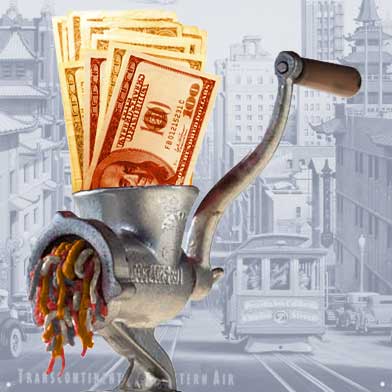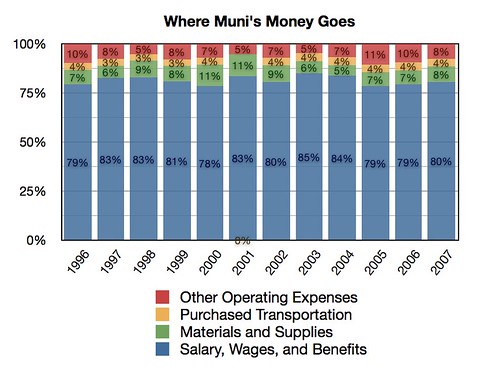
Nobody likes losing their job — especially Muni drivers, who have it pretty sweet.
But times are tough, thanks largely to local and state leaders who raid transit whenever their pet projects need more cash. At the beginning of the month, the Appeal predicted that service cuts and fare hikes are not far off; and sure enough, Muni’s new budget has us paying more for less service as soon as May.
But customers aren’t the only ones suffering from political disinterest in transit: layoffs are coming even sooner.
So how much money will Muni save by slashing jobs? That’s unclear. Layoffs don’t always equal cost savings, since the agency will lose the productivity of those lost employees.
But employees make up a sizable chunk of change for the agency. For the last decade, wages, salaries, and benefits have made up around 80% of Muni’s expenses.
That may seem crazy, but it’s actually not too different from other transit agencies. Among other agencies that we examined, 80% was about normal. Humans are expensive! If we were writing about schools, we’d point out that teachers cost a lot of money; the fire department would have a lot more cash on hand if they didn’t have to pay the firefighters; and the most expensive part of checking restaurants for roaches is paying the inspector.
SF still has a unique problem with Muni salaries, though. For the past 40 years, Muni’s used a peculiar formula that ensures that our drivers are among the highest-paid in the country. No other city employees get this deal; there’s no allowance for negotiation; and there are virtually no performance-based incentives or penalties.
Muni drivers are the second-highest paid in the nation. Are we getting what we’re paying for? Do you feel as though the service that you receive from Muni employees is the among the country’s best?
In exchange for this arrangement, Muni drivers aren’t allowed to strike. But that hasn’t stopped “unofficial” strikes in the past, when drivers have called in sick or even blocked bus routes.
So like we said: for drivers, it’s pretty sweet. Or at least, it’s sweet until politicians starve you for money, forcing the agency to start tossing out anything that’s not bolted to the floor.
Source of data: National Transit Database










